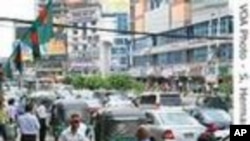U.S. Ambassador to Bangladesh James Moriarty says Bangladesh is "a vibrant nation with a thriving civil society" and a "tradition of moderation and tolerance" – a tradition, that some extremists would like to end.
In a recent statement to the United States Commission on International Religious Freedom, Ambassador Moriarty said U.S. interests in Bangladesh revolve around 3 mutually reinforcing principles – democracy, development, and the denial of space to terrorism.
"Bangladesh's track record with democracy is mixed," said Ambassador Moriarty. "There has been real progress in the formal aspects of the electoral process, including voter registration. Little improvement has been made on substantive issues like transparency," he said. "Each successive government has increasingly centralized power at the national level – a winner take all mentality dominates."
Mr. Moriarty noted that the Caretaker Government has remained committed to the electoral roadmap announced in July 2007. The military has pledged to support the return to democracy. The Caretaker Government has set the conditions for free, fair and credible elections by the end of December. It has also pledged to remove the state of emergency prior to the elections. The U.S., he said, has urged the political parties to play their part and to engage in constructive dialogue with the Election Commission and the Caretaker Government.
"The U.S. and others in the international community continue to press for improvements in human rights inside Bangladesh," said Mr. Moriarty. "We are seeing some progress," he said. But the continued failure of local authorities to fully investigate all types of human rights violations is troubling.
Development in Bangladesh still faces serious obstacles, said Ambassador Moriarty. The recent global economic crisis has raised concerns about whether Bangladesh can sustain economic growth rates of 5 to 7 percent annually. Food prices have risen sharply over the past year. To help Bangladesh meet its needs, the U.S. Agency for International Development manages the U.S. Government's food aid and development program for Bangladesh.
The U.S. also supports Bangladesh's efforts to combat terrorism. Through its Leaders of Influence Program, the U.S. is working with religious leaders in Bangladesh to help strengthen community efforts to upgrade health and education, combat human trafficking, and improve local governance. Despite the challenges, Ambassador Moriarty says he is optimistic. "Bangladeshis," he said, "are deeply committed to democracy."
In a recent statement to the United States Commission on International Religious Freedom, Ambassador Moriarty said U.S. interests in Bangladesh revolve around 3 mutually reinforcing principles – democracy, development, and the denial of space to terrorism.
"Bangladesh's track record with democracy is mixed," said Ambassador Moriarty. "There has been real progress in the formal aspects of the electoral process, including voter registration. Little improvement has been made on substantive issues like transparency," he said. "Each successive government has increasingly centralized power at the national level – a winner take all mentality dominates."
Mr. Moriarty noted that the Caretaker Government has remained committed to the electoral roadmap announced in July 2007. The military has pledged to support the return to democracy. The Caretaker Government has set the conditions for free, fair and credible elections by the end of December. It has also pledged to remove the state of emergency prior to the elections. The U.S., he said, has urged the political parties to play their part and to engage in constructive dialogue with the Election Commission and the Caretaker Government.
"The U.S. and others in the international community continue to press for improvements in human rights inside Bangladesh," said Mr. Moriarty. "We are seeing some progress," he said. But the continued failure of local authorities to fully investigate all types of human rights violations is troubling.
Development in Bangladesh still faces serious obstacles, said Ambassador Moriarty. The recent global economic crisis has raised concerns about whether Bangladesh can sustain economic growth rates of 5 to 7 percent annually. Food prices have risen sharply over the past year. To help Bangladesh meet its needs, the U.S. Agency for International Development manages the U.S. Government's food aid and development program for Bangladesh.
The U.S. also supports Bangladesh's efforts to combat terrorism. Through its Leaders of Influence Program, the U.S. is working with religious leaders in Bangladesh to help strengthen community efforts to upgrade health and education, combat human trafficking, and improve local governance. Despite the challenges, Ambassador Moriarty says he is optimistic. "Bangladeshis," he said, "are deeply committed to democracy."













